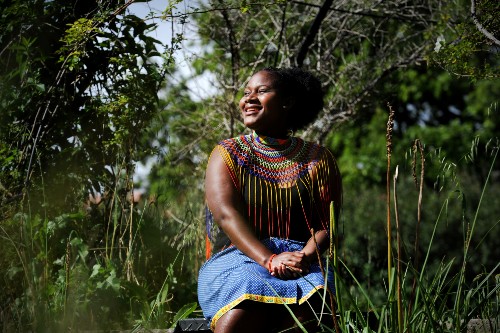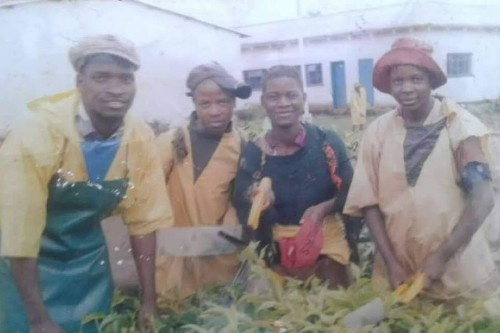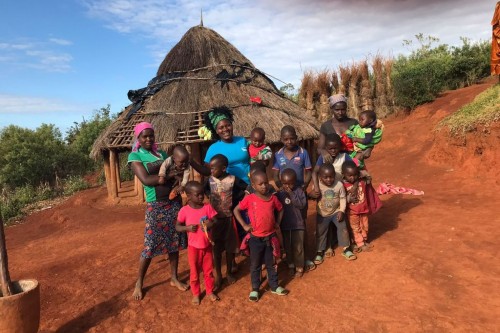Bongai was born during Mozambique’s bloody civil war. From her family’s temporary home a few miles over the border in Zimbabwe, they could hear the conflict rage around their village.
Soon after the fighting ended Bongai’s father died, and she and her 13 siblings and step-siblings returned home to their life as subsistence maize farmers in their village in Mossurize district, Mozambique.
Long walk to education
It was from here that Bongai would set off at 5am each day, walking barefoot for four hours to get to Mafumise Primary School across the border in Zimbabwe. And it was here that she returned to each evening after another four hour trek, her belly empty but her head full.
At the time, Bongai knew little of the dangers that beset the route: the rogue soldiers, wild animals and muti killers – murderers who kill people and sell their body parts for ritual medicine. Instead, it was the forest ghosts – said to be the spirits of dead kings – that made her young heart beat with fear.
“As a child you think all the adults you meet are going to be friends. As I walked through the forest in the dark I prayed to meet men – anyone but the ghosts,” she said.
“When I was 12 years old a family friend was murdered in our village and my mother decided it was too dangerous for me to walk to school. I wasn’t happy because I loved school, but I had to comply. It was also very expensive for the uniform and books.
“Instead I helped in the fields. One day I walked to my old school to sell bananas and my teacher, Mr Chipongo, spotted me. I explained that I had no choice but to stop studying and he offered to pay for my Grade 7 exams.”
Like so many that would come after, this simple selfless act would change Bongai’s life.
Although she was too busy in the fields to go to school, she was able to study at home, devouring the teacher’s notes late into the night by the light of grass fires.
‘Earn and learn’
Typically, Bongai aced the exams and aged 15, she moved to a Zimbabwean tea plantation where she could “earn and learn”.
“We picked tea leaves from 6am to midday and then studied at school until 7pm,” she explained.
“It was tiring and sometimes we’d fall asleep during lessons but I was so happy to be learning, so pleased to have textbooks and teachers. And it was much better than walking eight hours every day.”
In a country where women marry young and education opportunities are few, Bongai beat her own path.
Today, aged 31, she is studying for a joint PhD at Cape Town University (UCT) and the University of Bristol, a new scheme which sees her split her time between the two cities. But then, aged 18, the idea of going to university at all was a storybook dream.
With top grades under her belt, Bongai was able to get a place at the University of Zimbabwe, the country’s top institution.
Her family spent days calling friends and neighbours to pull together the necessary funds. They were successful, but in the end Bongai was offered a Government of Zimbabwe Cadet Scholarship and she moved to the capital Harare to study economics.
The accidental scholar
Later, as she worked as a maid to save for a graduation gown, she was offered a job as a teaching assistant at the University. Her monthly salary soared from US$60 to US$1,500.
While teaching she studied for a masters. Graduating in 2016 she was capped by then-President of Zimbabwe, Robert Mugabe.
But life had more surprises in store for Bongai. Testing UCT’s application process for a friend, she wrote out a mock application on herself and was stunned when a few weeks later she was given a place at the University’s School of Economics.
As she prepared to go to one of the world’s top universities, her siblings banded together to raise the funds. She planned to study for the first semester and then leave to work for as long as she needed to afford another semester.
But impressed by her assignments and her story of tireless fortitude, her lecturer Prof Murray Leibbrandt, ensured she was given a scholarship: “For the first time ever I could simply focus on being a student.”
Then, in 2019 through a joint academic agreement between UCT and the University of Bristol, and funded by a Cotutelle Scholarship, Munguni entered a joint PhD: the inaugural UCT–Bristol University Researchers without Borders programme. She is being supervised by Professor David Gordon and Professor Richard Harris.
Leaving Africa
She studied at Bristol during the 2019/2020 academic year – the first time she had left Africa - and will return to the city in 2022.
Bongai was introduced to Jenny and David Cobbold, who volunteered to deliver her arthritis medicine and made her feel at home in Bristol, and Avril Chadwick and her family.
Avril offered Bongai accommodation at their home in Congresbury, Somerset, but refused to charge her rent.
“It was like having another family. Their friends became my friends, their family became my family,” Bongai said. “We ate together – African food three nights a week and English food the other nights.
“And we would take the car to places all over – the suspension bridge, Oxford, different churches. It was so amazing.
“I’ll always treasure my time at Bristol – I loved the lectures and the people and I can’t wait to come again.”
Giving back
The Chadwicks helped Bongai collect second-hand clothes to ship back to Mozambique and set-up a crowd-funding page to raise money for a borehole so her home village could get easy access to clean water.
“We were donated so many things – clothes, toys, books. When the clothes arrived in Mozambique the kids were so happy, for some of them it was the first time they had worn nice clothes,” Bongai said.
The crowd-funding page raised £2,600 and added to the £2,500 of rent that Bongai did not have to pay, it was enough for the borehole to be dug last week.
Bongai hopes the new infrastructure will mean the women of the village do not need to spend hours each day collecting water from the river, and can instead begin their own education journeys.
The long walk isn’t over
But Bongai’s ambitions are far from satisfied. She is helping to teach maths to children free via What’s App, a scheme she hopes to grow over the coming years. She writes out notes and records voice notes (videos take up too much data) so the children can learn at home.
It is helpful for those grounded by coronavirus and also for those whose walk to school is an eight hour round trip.
In two years’ time she will graduate from Bristol and UCT with a PhD from each ("I have told my friends they have to call me doc-doc"). Afterwards she hopes to become a professor – perhaps via post-doc work at Harvard or Oxford – as well as a social entrepreneur.
Professor David Gordon, Bongai’s PhD supervisor at Bristol, said: “Bongai is an inspiration to others and has overcome numerous obstacles to obtain the academic knowledge she needs to help her local community and the people of Mozambique."
Bongai said: “I want to help community’s create businesses so they can become self-sufficient, for the community and by the community.
“I want to remove barriers so anyone can get the education they deserve.”
Bongai and her Bristol ‘family’ are still collecting money to connect more houses to the borehole. You can donate here.


